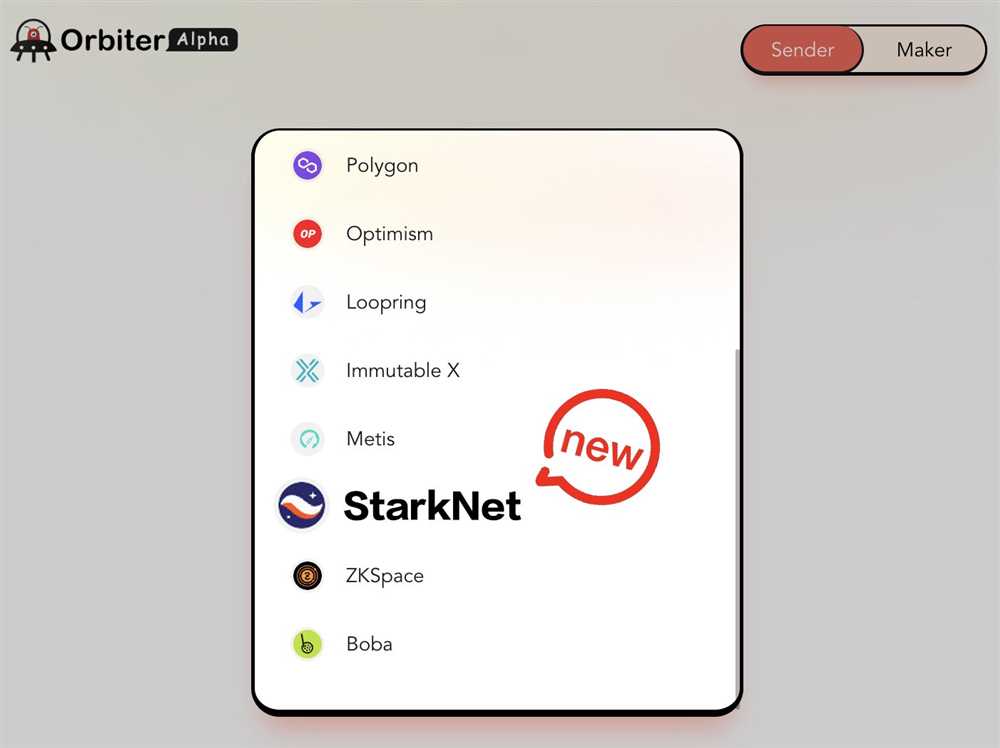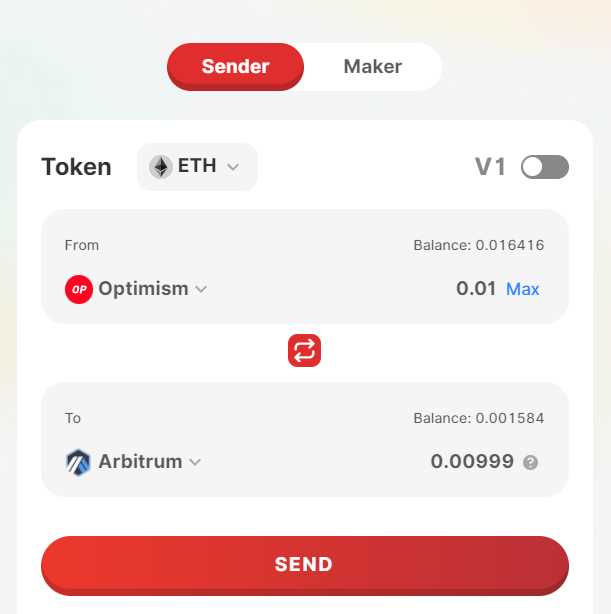
Orbiter Finance: Reducing Dependency on Smart Contracts for Transfers

Orbiter Finance, a revolutionary DeFi platform, is introducing a groundbreaking solution to minimize reliance on smart contracts for transfers. As the DeFi industry continues to grow, the limitations and potential risks associated with smart contracts have become more apparent. Orbiter Finance addresses these concerns by implementing a unique transfer mechanism that significantly reduces the need for smart contracts.
Traditional DeFi platforms heavily rely on smart contracts to facilitate transactions and transfers. While smart contracts offer transparency, security, and immutability, they are not without their drawbacks. Smart contracts can be subject to vulnerabilities and exploits, which can lead to significant financial losses for users. Additionally, the execution of smart contracts requires gas fees, contributing to high transaction costs and network congestion.
Orbiter Finance takes a novel approach by leveraging a combination of off-chain and on-chain mechanisms to optimize the transfer process. By utilizing off-chain technology, Orbiter Finance reduces the dependency on smart contracts for transaction execution. This approach minimizes the risk of potential vulnerabilities and significantly lowers gas fees, leading to more efficient and cost-effective transfers.
The off-chain technology employed by Orbiter Finance ensures swift and seamless transactions without sacrificing security or decentralization. By decoupling certain aspects of the transfer process from smart contracts, Orbiter Finance achieves a balance between speed, reliability, and cost-effectiveness. Users can enjoy fast and affordable transfers while maintaining control over their funds.
With its innovative transfer mechanism, Orbiter Finance is setting a new standard in the DeFi industry. By minimizing reliance on smart contracts, Orbiter Finance addresses the limitations and risks associated with this technology, providing users with a more secure and efficient platform for their financial transactions.
Understanding the Role of Smart Contracts in Transfers
Smart contracts play a crucial role in facilitating secure and reliable transfers within the Orbiter Finance platform. By leveraging blockchain technology, these contracts enable the automation and execution of transactions without the need for intermediaries.
Automated and Transparent Transactions

One of the key advantages of utilizing smart contracts in transfers is the ability to automate the entire process. When users initiate a transfer, the smart contract automatically verifies the validity of the transaction and executes it once all the predefined conditions are met.
Furthermore, smart contracts provide transparency in transfers. As the contract code is immutable and visible to all participants on the blockchain network, there is no room for manipulation or tampering. This ensures that transfers are conducted in a fair and transparent manner.
Reduced Counterparty Risk

Smart contracts also help minimize counterparty risk in transfers. Traditionally, transfers involving multiple parties require trust in intermediaries to facilitate the transaction. However, with smart contracts, the need for intermediaries is eliminated, reducing the risk of fraud or default.
Through the use of predefined rules and conditions encoded in the smart contract, transfers are executed only when all the requirements are met. This eliminates the need to rely on the integrity or trustworthiness of third parties, providing a higher level of security and reliability.
Overall, smart contracts play a vital role in improving the efficiency, security, and transparency of transfers within the Orbiter Finance platform. By automating transactions and reducing reliance on intermediaries, users can enjoy seamless and trustworthy transfers.
Limitations of Smart Contracts in Transfers

While smart contracts have revolutionized the way transactions are conducted on the blockchain, they also come with certain limitations, especially when it comes to transfers of assets. Some of these limitations include:
- Speed: Smart contracts are executed on the blockchain, which can be slow compared to traditional payment systems. This can result in longer settlement times for transfers, especially during periods of high network congestion.
- Cost: Transferring assets through smart contracts can be costly due to the fees associated with executing and validating the contract on the blockchain. These fees can be significant, especially for transfers involving high-value assets.
- Immutability: Once a transfer is executed through a smart contract, it becomes immutable and cannot be easily reversed or modified. This lack of flexibility can be a disadvantage when it comes to resolving disputes or correcting errors in transfers.
- External Data: Smart contracts are generally unable to directly access external data sources, such as real-time market prices or off-chain information. This limitation can restrict the functionality of smart contracts in transfers, especially for assets whose value is dependent on real-world events or data.
- Complexity: Developing and deploying smart contracts requires expertise in programming and blockchain technology. This complexity can be a barrier for individuals or organizations looking to utilize smart contracts for asset transfers.
- Scalability: As the number of transactions on the blockchain increases, the scalability of smart contracts can become a challenge. Congested networks can lead to delays and increased costs for transfers.
Despite these limitations, smart contracts continue to be a powerful tool for executing transfers on the blockchain. However, alternative solutions, such as those offered by Orbiter Finance, can help minimize reliance on smart contracts and address some of these limitations to provide a more efficient and user-friendly transfer experience.
How Orbiter Finance Overcomes Smart Contract Reliance
Smart contracts have become an integral part of the blockchain ecosystem, enabling secure and automated transactions. While they offer numerous benefits, Orbiter Finance recognizes the limitations and potential risks associated with relying solely on smart contracts for transfers.
1. Introducing Layer 2 Solutions
In order to minimize reliance on smart contracts, Orbiter Finance has incorporated Layer 2 solutions into its platform. These solutions enable off-chain transactions, allowing for faster and more scalable transfers. By utilizing Layer 2 solutions such as state channels and sidechains, Orbiter Finance is able to reduce the burden on smart contracts while maintaining the security and integrity of transactions.
2. Implementing a Trustless Oracle System
To further mitigate reliance on smart contracts, Orbiter Finance has implemented a trustless oracle system. Oracles provide access to external data and play a crucial role in verifying and validating transactions. By utilizing a trustless oracle system, Orbiter Finance ensures the accuracy and reliability of external data, reducing the risk of smart contract exploits and failures.
Benefits of Overcoming Smart Contract Reliance

By overcoming smart contract reliance, Orbiter Finance offers several benefits to its users:
- Improved Scalability: By utilizing Layer 2 solutions, Orbiter Finance achieves increased scalability, enabling faster and more efficient transfers.
- Enhanced Security: The trustless oracle system implemented by Orbiter Finance enhances the security of transactions by validating external data sources and minimizing the risk of smart contract vulnerabilities.
- Reduced Costs: Minimizing reliance on smart contracts can help reduce gas fees and transaction costs, making the platform more affordable for users.
Overall, by integrating Layer 2 solutions and implementing a trustless oracle system, Orbiter Finance is able to overcome smart contract reliance and provide a more efficient, secure, and cost-effective platform for users.
Exploring Orbiter Finance’s Alternative Transfer Mechanisms
While smart contracts are a core component of decentralized finance (DeFi) platforms, Orbiter Finance takes a unique approach to minimize reliance on these contracts for transfers. They have implemented alternative mechanisms that provide benefits such as increased efficiency, lower gas fees, and improved scalability.
Efficient Layer 2 Solutions
Orbiter Finance leverages layer 2 solutions to facilitate faster and cheaper transfers. By utilizing technologies such as sidechains, state channels, or rollups, they are able to offload some of the transaction processing from the main Ethereum network. This reduces congestion and allows for quicker and more cost-effective transfers.
Off-Chain Trading
Another alternative transfer mechanism employed by Orbiter Finance is off-chain trading. By conducting transactions off the blockchain, they can achieve instant transfers with zero gas fees. This is made possible through the use of trusted intermediaries or atomic swaps where parties exchange assets off-chain and only settle the final result on the blockchain.
Cross-Chain Interoperability
Orbiter Finance recognizes the importance of cross-chain interoperability in a multi-chain ecosystem. They have developed mechanisms to facilitate transfers between different blockchain networks, enabling users to seamlessly move assets across platforms. This reduces the need for reliance on smart contracts and allows for more flexibility in transfers.
These alternative transfer mechanisms offered by Orbiter Finance showcase their commitment to improving the user experience and addressing the limitations of smart contract-based transfers. By leveraging layer 2 solutions, off-chain trading, and cross-chain interoperability, they strive to provide efficient, low-cost, and flexible transfer options for their users.
Benefits of Using Orbiter Finance for Transfers

Orbiter Finance offers several key benefits for users when it comes to transfers. These advantages make it an ideal platform for individuals and businesses alike:
1. Enhanced security:

The Orbiter Finance platform utilizes a unique security protocol that minimizes the reliance on smart contracts for transfers. This approach significantly reduces the risk of hacking and unauthorized access to users’ funds. By implementing a robust security framework, Orbiter Finance ensures the safety and integrity of transactions.
2. Faster transaction speed:
Unlike traditional blockchain networks that can be slow and congested, Orbiter Finance leverages cutting-edge technology to facilitate faster transfer speeds. Transactions are processed within seconds, allowing users to send and receive funds swiftly without delays. This level of efficiency is especially beneficial for time-sensitive transactions or urgent payments.
3. Lower transaction fees:
By minimizing the reliance on smart contracts, Orbiter Finance significantly reduces transaction fees compared to other blockchain platforms. The low fees make it more cost-effective for users, especially for those who frequently engage in transfers or micropayments. This cost savings can add up over time and result in significant financial benefits for individuals and businesses.
4. Seamless integration with existing systems:

Orbiter Finance is designed to seamlessly integrate with existing payment systems and infrastructure. This makes it easier for businesses to adopt the platform without requiring significant changes to their current operations. The compatibility with other systems ensures a smooth transition and minimizes disruptions during the implementation process.
| Benefits | Orbiter Finance | Traditional Blockchain Networks |
|---|---|---|
| Enhanced security | ✓ | ✗ |
| Faster transaction speed | ✓ | ✗ |
| Lower transaction fees | ✓ | ✗ |
| Seamless integration | ✓ | ✗ |
Q&A:
How does Orbiter Finance minimize reliance on smart contracts for transfers?
Orbiter Finance minimizes reliance on smart contracts for transfers by utilizing layer two solutions. These solutions are built on top of the Ethereum blockchain and allow for faster and cheaper transactions without the need for executing smart contracts for every transfer. This reduces gas fees and improves scalability.
What are layer two solutions?
Layer two solutions are protocols or frameworks built on top of an existing blockchain, such as Ethereum, that aim to improve its scalability and throughput. These solutions allow for off-chain processing of transactions, reducing the burden on the main blockchain and minimizing reliance on smart contracts for every transfer.
Why is minimizing reliance on smart contracts important?
Minimizing reliance on smart contracts is important because executing smart contracts for every transaction can be costly and time-consuming. By utilizing layer two solutions, such as those implemented by Orbiter Finance, transaction fees can be reduced, and the overall user experience can be improved. Additionally, it allows for greater scalability, as the main blockchain is not burdened with executing smart contracts for every transfer.


